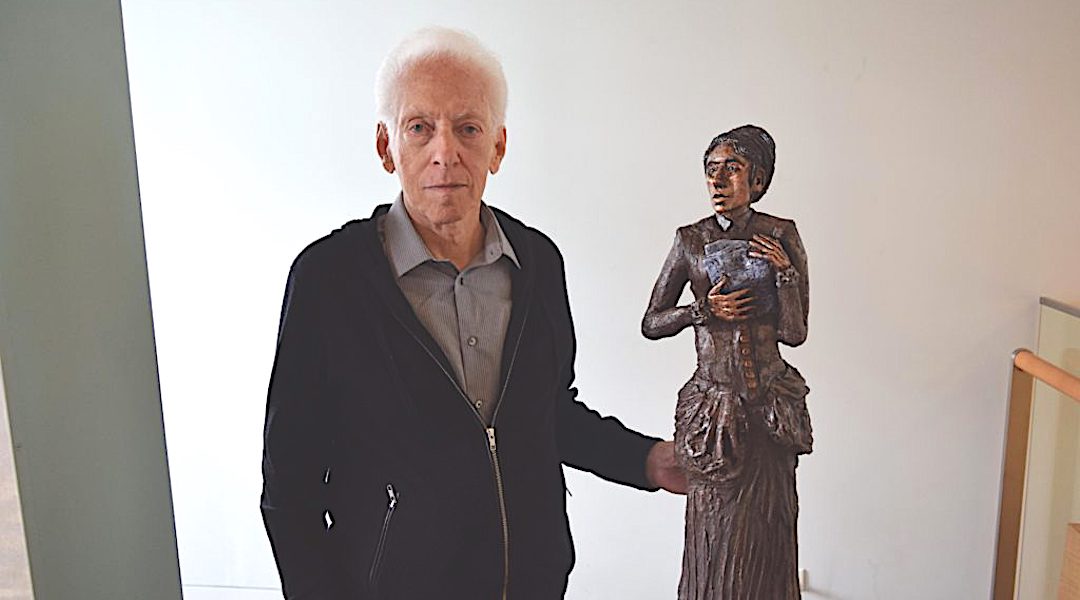Phillip Ratner, sculptor whose work tells immigrants’ stories at NYC landmarks, dies at 86
The Washington-area artist’s bronzes adorn the museums at Ellis Island and the Statue of Liberty

Phillip Ratner with his sculpture of Emma Lazarus in 2017. (Courtesy of the National Museum of American Jewish History)
(JTA) — Washington-area artist Phillip Ratner, whose bronze sculptures of immigrants and other historical figures are fixtures at exhibits at the Statue of Liberty and Ellis Island, died Nov. 9 at his home in Bethesda, Maryland. He was 86.
Ahead of Lady Liberty’s centennial in the 1980s, the National Park Service commissioned Ratner to create statues representing immigrants who entered the country through Ellis Island between 1892 and 1954 as well as figures central to the history of the Statue of Liberty, including the Jewish poet Emma Lazarus.
Ratner had to raise the funds for the sculptures himself, a task he gladly took on.
“Telling the story of my grandparents coming to this country and making it their home — a story that connects many Americans — is a passion of mine,” Ratner said in 2017, when he donated models for 10 of those works to the National Museum of American Jewish History in Philadelphia.
Ratner and his cousin Dennis Ratner were also the founders, in 1985, of the Israel Bible Museum in Safed, Israel, a collection of sculpture, painting and graphics related to the Bible. It later relocated to Beersheva.
Born in Washington, Ratner studied art at the Pratt Institute in New York and American University in Washington, and taught art — including at the Charles E. Smith Jewish Day School in Rockville, Maryland — before devoting himself full-time to his artwork.
His survivors include his wife, the former Ellen Miles, and four children from his first marriage to Miriam Levine: Hal Ratner of Chicago, Marni Ratner of Olney, Maryland and Sari Ratner Judge and Jennifer Ratner-Rosenhagen, both of Madison, Wisconsin, and nine grandchildren.
This article originally appeared on JTA.org.
The Forward is free to read, but it isn’t free to produce

I hope you appreciated this article. Before you go, I’d like to ask you to please support the Forward.
Now more than ever, American Jews need independent news they can trust, with reporting driven by truth, not ideology. We serve you, not any ideological agenda.
At a time when other newsrooms are closing or cutting back, the Forward has removed its paywall and invested additional resources to report on the ground from Israel and around the U.S. on the impact of the war, rising antisemitism and polarized discourse.
This is a great time to support independent Jewish journalism you rely on. Make a gift today!
— Rachel Fishman Feddersen, Publisher and CEO
Support our mission to tell the Jewish story fully and fairly.
Most Popular
- 1

Culture Cardinals are Catholic, not Jewish — so why do they all wear yarmulkes?
- 2

News School Israel trip turns ‘terrifying’ for LA students attacked by Israeli teens
- 3

Fast Forward Ye debuts ‘Heil Hitler’ music video that includes a sample of a Hitler speech
- 4

Fast Forward Student suspended for ‘F— the Jews’ video defends himself on antisemitic podcast
In Case You Missed It
-

Yiddish קאָנצערט לכּבֿוד דעם ייִדישן שרײַבער און רעדאַקטאָר באָריס סאַנדלערConcert honoring Yiddish writer and editor Boris Sandler
דער בעל־שׂימחה האָט יאָרן לאַנג געדינט ווי דער רעדאַקטאָר פֿונעם ייִדישן פֿאָרווערטס.
-

Fast Forward Trump’s new pick for surgeon general blames the Nazis for pesticides on our food
-

Fast Forward Jewish feud over Trump escalates with open letter in The New York Times
-

Fast Forward First American pope, Leo XIV, studied under a leader in Jewish-Catholic relations
-
Shop the Forward Store
100% of profits support our journalism
Republish This Story
Please read before republishing
We’re happy to make this story available to republish for free, unless it originated with JTA, Haaretz or another publication (as indicated on the article) and as long as you follow our guidelines.
You must comply with the following:
- Credit the Forward
- Retain our pixel
- Preserve our canonical link in Google search
- Add a noindex tag in Google search
See our full guidelines for more information, and this guide for detail about canonical URLs.
To republish, copy the HTML by clicking on the yellow button to the right; it includes our tracking pixel, all paragraph styles and hyperlinks, the author byline and credit to the Forward. It does not include images; to avoid copyright violations, you must add them manually, following our guidelines. Please email us at [email protected], subject line “republish,” with any questions or to let us know what stories you’re picking up.












